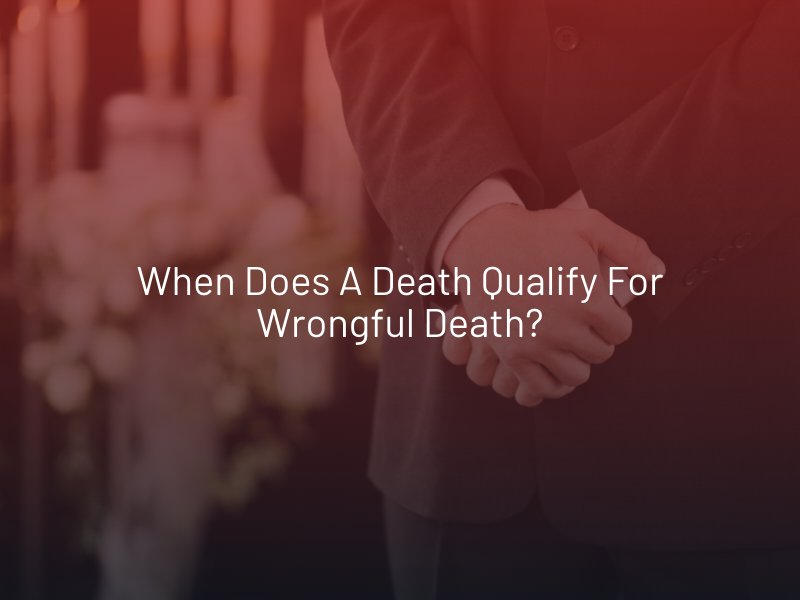When Does a Death Qualify for Wrongful Death?
When a person is killed in a preventable accident, it is generally considered a wrongful death. A wrongful death occurs when another party unlawfully causes a death by acting recklessly, negligently, or intentionally.

Elements of a Wrongful Death Case
The following elements determine whether a death qualifies as a wrongful death:
- A human being died;
- The victim was killed intentionally or due to the negligence of another;
- Surviving family members of the deceased suffered financial losses due to the death. (e.g., funeral and burial expenses, loss of expected income, services, companionship, etc.)
Wrongful death occurs when an at-fault party fails to provide the expected level of care to prevent a fatality. Many situations may give rise to a wrongful death claim, such as car accidents, workplace accidents, medical malpractice, defective products, criminal acts of violence, etc.
Proving a Wrongful Death Claim
To claim compensation in a Nevada wrongful death lawsuit, the personal representative of the deceased’s estate or surviving family members must prove the following:
- Duty of Care: The defendant (at-fault party) owed the deceased a duty of care—for example, in a car accident wrongful death case, the at-fault driver owed a duty to the victim to drive safely and obey traffic laws.
- Breach of Duty: The defendant party violated their duty by failing to act with the same level of care that a reasonable person would have shown in a similar situation—for example, a driver who speeds through a school zone or is texting while driving.
- Causation: The at-fault party’s breach of their duty of care directly caused the individual’s death. In other words, your loved one would not have been killed if not for the defendant’s breach of duty.
- Damages: The surviving family suffered losses as a result of their loved one’s death.
If successful, loved ones can be compensated for medical expenses incurred due to the injury before their death, funeral and burial expenses, loss of the deceased’s income, loss of inheritance, loss of care, guidance, love, companionship, and more. In some cases, the family may be able to claim compensation for the deceased’s conscious pain and suffering if there was time between the accident and their death.
Evidence of Wrongful Death
Pursuing a wrongful death claim and successfully recovering compensation can be challenging without an experienced wrongful death attorney in Las Vegas. They will have the resources to help you build a solid case against the defendant. That includes investigating to gather the necessary evidence to use as grounds for the claim and as proof of the at-fault party’s liability. An attorney will also help you with:
- Determining all liable parties.
- Obtaining police reports and photos or videos of the accident or the scene.
- Obtaining copies of medical records, receipts, and other paperwork that documents losses.
- Interviewing eyewitnesses.
- Hiring various experts to testify, such as an accident reconstruction expert to demonstrate how the accident occurred and prove fault, or a forensic accountant to show how your family’s lives will be impacted financially.
Nevada applies the law of modified comparative negligence in wrongful death cases. This law reduces a surviving family’s compensation based on their loved one’s contribution to the accident which caused their death. For example, if the deceased’s estate is awarded $500,000, but the deceased victim was 30% responsible for their accident, the family will only receive 70% of the award, or $350,000. If the deceased was more than 50 percent responsible, the surviving family cannot recover any compensation.